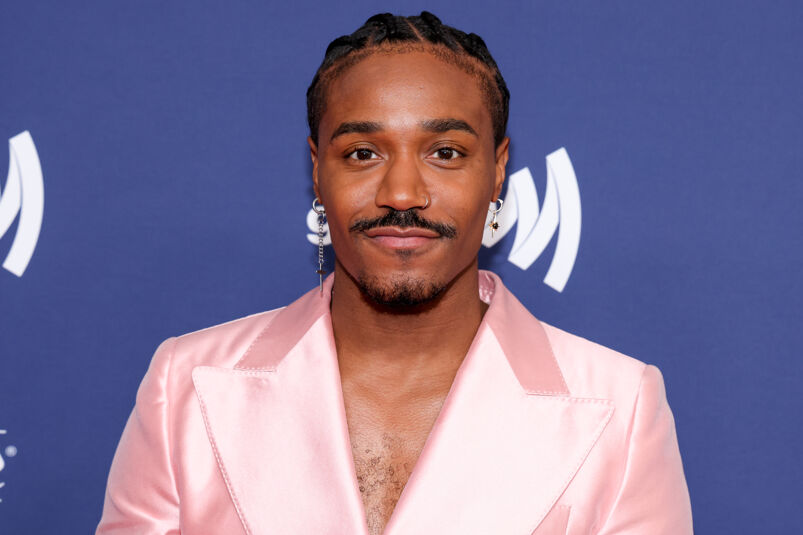
Queer comedian, actor, and writer Dewayne Perkins is living out his dream.
Born in Chicago, Perkins took an early interest in comedy and improv, and eventually began performing with the acclaimed sketch group 3Peat (other past members include former SNL star Chris Redd and Fire Island‘s Torian Miller).
While with 3Peat, he wrote a sketch inspired by the unfortunate horror movie trope wherein the Black characters always seem to die first—but if all the characters are Black, then how does the slasher decide who to make his first victim?
The ingenious premise eventually became the digital short “The Blackening,” which was a viral hit when it dropped online back in 2018 and caught the attention of Girls Trip writer Tracy Oliver and Barbershop director Tim Story, who approached Perkins to turn the concept into a feature film.
Cut to five years later, and The Blackening is about to be the horror-comedy of the summer, co-written by and starring Perkins himself. It’s a full-circle moment for the performer, whose career—which also includes roles on The Upshaws and Saved By The Bell, as well as writing credits on Brooklyn Nine-Nine and his Emmy-nominated work on The Amber Ruffin Show—is only just getting started.
Ahead of The Blackening‘s theatrical release on June 16, we invited Perkins to be the latest guest in our rapid-fire Q&A series, Dishin’ It. In the interview, he opens up about depicting the intersection of Blackness and queerness in his new movie, what he’s learned from getting into full drag (as Beyoncé, no less!), and the surprising blockbuster where he saw his first example of men loving men.
Is there a piece of media—whether a movie, TV series, book, album, games, etc…—that you consider a big part of your own coming-out journey, or that has played an important part in exploring your own queerness? Why does it stand out to you?
There are a couple pieces of media that come to mind when I think about like my personal coming out journey. One of them that was pretty significant was The Real World—I believe it was Philadelphia? That’s the one where Karamo was on it. That was the first time I remember actively seeing a queer Black man on TV. And I remember watching it and being like, “I have to watch this in secret because people aren’t going to know that like this is resonating too much.”
And then the second one would be the movie Armageddon. There was a particular scene, and I was pretty young—I was watching it with my family. And it’s a scene towards the end of the movie [where] Ben Affleck’s character is like, “Okay, I’m gonna sacrifice myself for the mission.” And then Bruce Willis pushes him into some elevator and he’s like, “No, I’m gonna sacrifice myself—go love my daughter!” And then Ben Affleck was like yelling and crying, “I love you! Don’t do this—I love you!” And I remember being like, “Oh, this man is telling this other man that he loves him?” That really did something for me. And I was like, “I’m gonna want that in the future”—but without those stakes. But just generally the love of two men.
The Blackening riffs on the horror movie trope that Black characters always die first. Since your character, Dewayne, is Black and queer, does that make him more vulnerable? What can you tease about how the intersection of those identities come into play in the film?
Absolutely! I think that there is an intentionality in the movie in regards to marginalized identities. And, without giving too much away, when you see the movie, you will see very clearly what that point of view is. It’s something that was very important for us to incorporate: To have the most marginalized be the most protected, recognizing that, in reality, we know who would be the most sacrificial within that setting. But we had to subvert the expectations.
If you could remake any movie with an all Black and queer cast, what would it be and why?
I haven’t given too much thought to this, but the first movie that came to mind—I’m just gonna go with it because I was like, “Ooh, that would be fun!”—is Mamma Mia!. Because, first of all, I want to be in Greece, trying to sing these songs, and have some fun. I think that would be a really fun movie to remake. Like, given the music and the setting, I think it could just be very cool and hip. Also, I love ABBA. So I’m trying to sing ABBA with a bunch of my Black friends.
The character Dewayne is also described as “the drama” of his friend group. Are you the drama of yours? If not, what friend group superlative would you say best suits you and why?
Okay, Dewayne is considered the drama of the group, but I am not—I would not consider myself to be the drama and my friend group. I would say I am the voice of reason within my friend group! I think a lot of my friends know me to be very in tune with my feelings, very open to conversing with other people about their feelings. I’m very deep and philosophical for the most part—and a little too blunt! So that is really how I fit. I’m a solution-based person. Sometimes my friends are like, “We’re not looking for solutions!,” and I get that, but that’s how I fit within my friend group.
Since it’s Pride Month, what’s something that you’re most proud of from this past year? (You know, in addition to the fact that you wrote and star in a major motion picture.)
Something I’m very proud of this year is… gaining a better mentality around work. I feel like there was a period where I was so overly invested in work, where I was kind of letting the rest of my life fall to the wayside because I was so concerned with my career. And I think now, this year, I have a greater focus and intentionality on really balancing my work life with a social life and really prioritizing joy and happiness.
You’ve gotten in full drag for The Upshaws—and also, iconically, Netflix’s short-lived The Break… as BEYONCÉ. What’s an important lesson you’d say you’ve learned from doing drag?
Okay, this is good. So, the two times I’ve been in drag have both been on a professional level. So that is something I learned very quickly, like, “Oh, this is a skill set that I do not have on my own.” I tried to drag on my own once for Halloween—me and a friend of mine…. terrible! [Laughs.] It did not look good, I did not feel the fantasy.
But the two times I was in drag, it really awakened something in me, just in terms of leaning that far into the femininity. I feel like I really balance that—where sometimes I’m more masculine, sometimes I’m more femme—but embodying a female persona really allowed me the space to fully lean into the feminine. And it was so empowering—and empowering in a way where I think every person should try drag at least once, to step outside of yourself and get a perspective that is not yours.
What’s something ridiculous you believed to be true when you were a kid? (i.e. the classic example: Santa Claus) How did you react when you found out the truth?
Something that I find very funny is that I did think Santa was very real. But the way that my parents characterized him was traumatizing. So, in my senior final—I went to school for animation—I did a stop-motion final about my relationship to Santa Claus. Because, when I was younger, my parents were like, “Oh, this is a tool to manipulate you into be a good person.” So they were like, “Oh, if you’re bad, you’re not going to get presents, but also Santa Claus is going to come and put coal in your eyes.” And I was like, “Oh no! This stranger white man is going to harm me if I’m bad!”
So, my senior final was about this little boy trying to kill Santa Claus because there was so much fear, like, “Well, I gotta get him before he gets me!” So that was something that, I when I found out, I said, “Oh, my parents are manipulators, they’re deceivers, they’re liars.” [Laughs.] And also, they’re buying the ones buying the gifts? So that was kind of sad, but also good because I recognized that the person I thought was a villain coming to get me wasn’t now real.
Who is a queer or trans artist/performer/creator that you think is doing really cool work right now? Why are they someone we should all be paying attention to?
A queer artist I really think is like doing it right now is Jeremy Pope. He’s such an inspiration to me in acting and performing, singing, fashion. And he always uses his platform to really speak to queerness, to Blackness. And there’s never been a point in his career where felt like he was hiding parts of himself, and I think that’s so empowering for other queer artists to see. So, yeah, Jeremy Pope—he’s that guy. Be my friend, Jeremy!


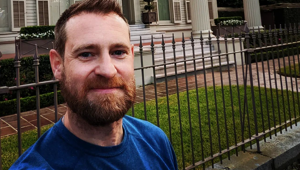
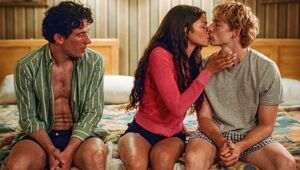
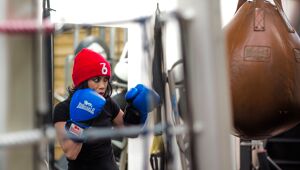
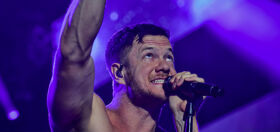



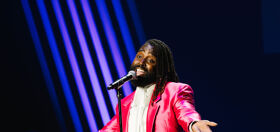
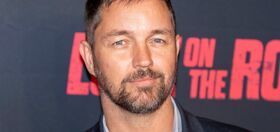
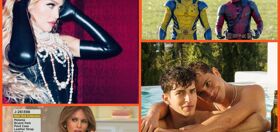
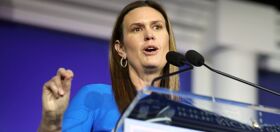

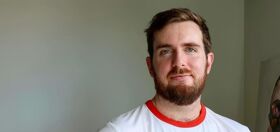
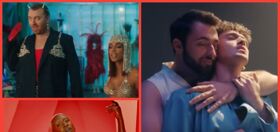
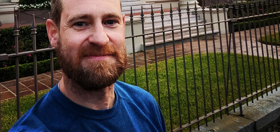

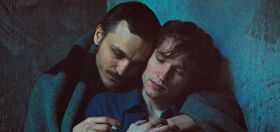
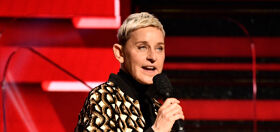
SDR94103
blaaah
Zambos271
He sounds funny. I look forward to seeing his work. I wish him well on his success!
Kangol2
He seems multitalented. I’m looking forward to The Blackening.